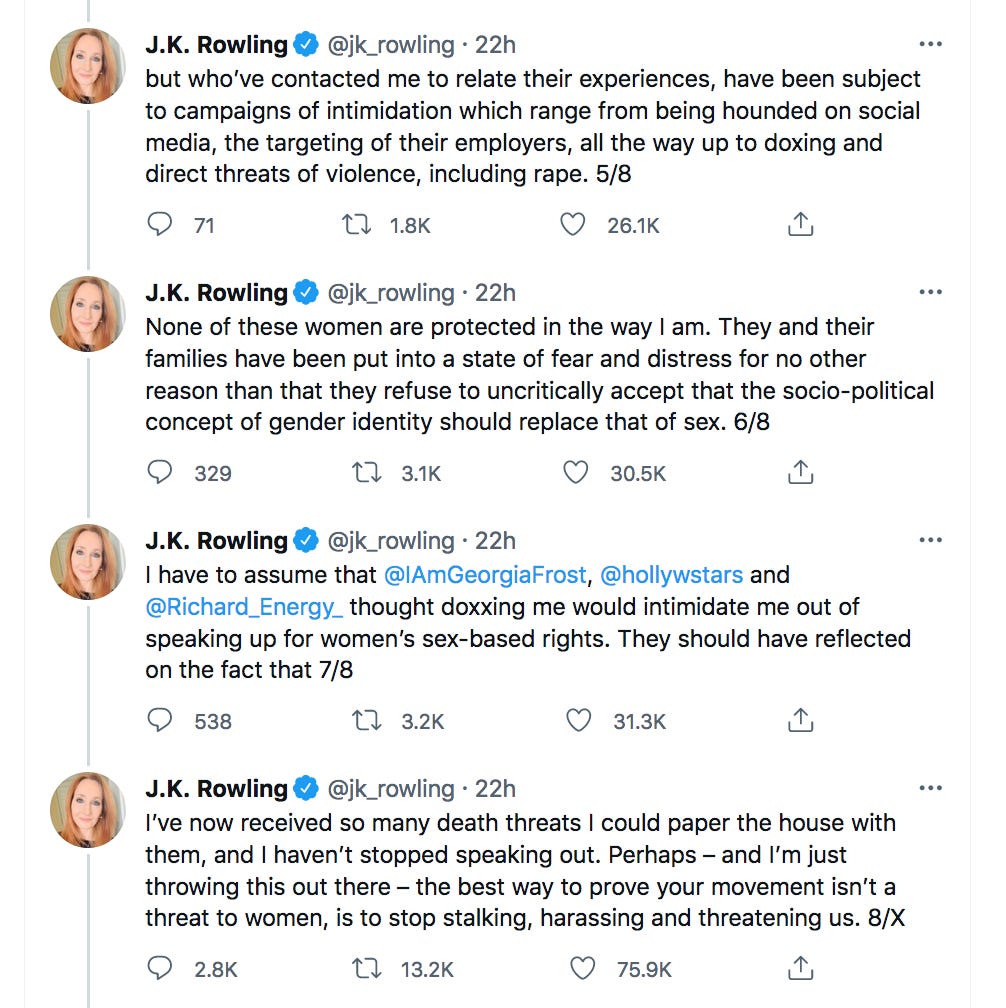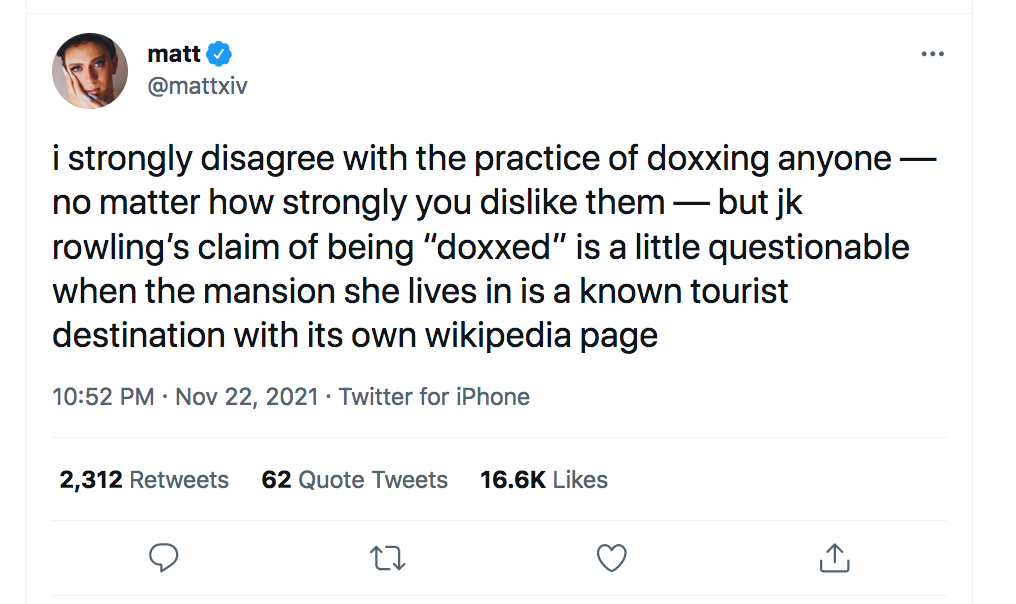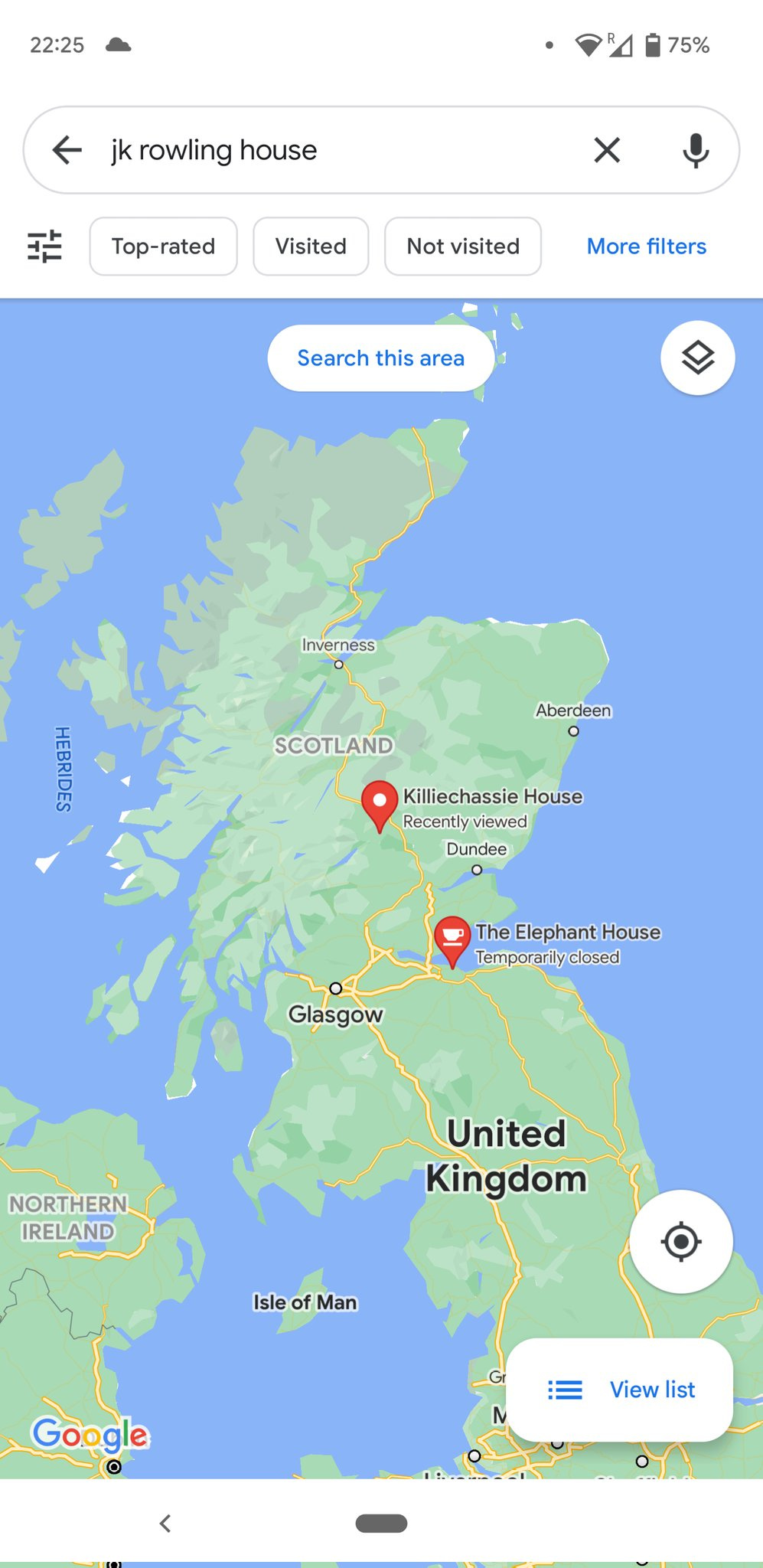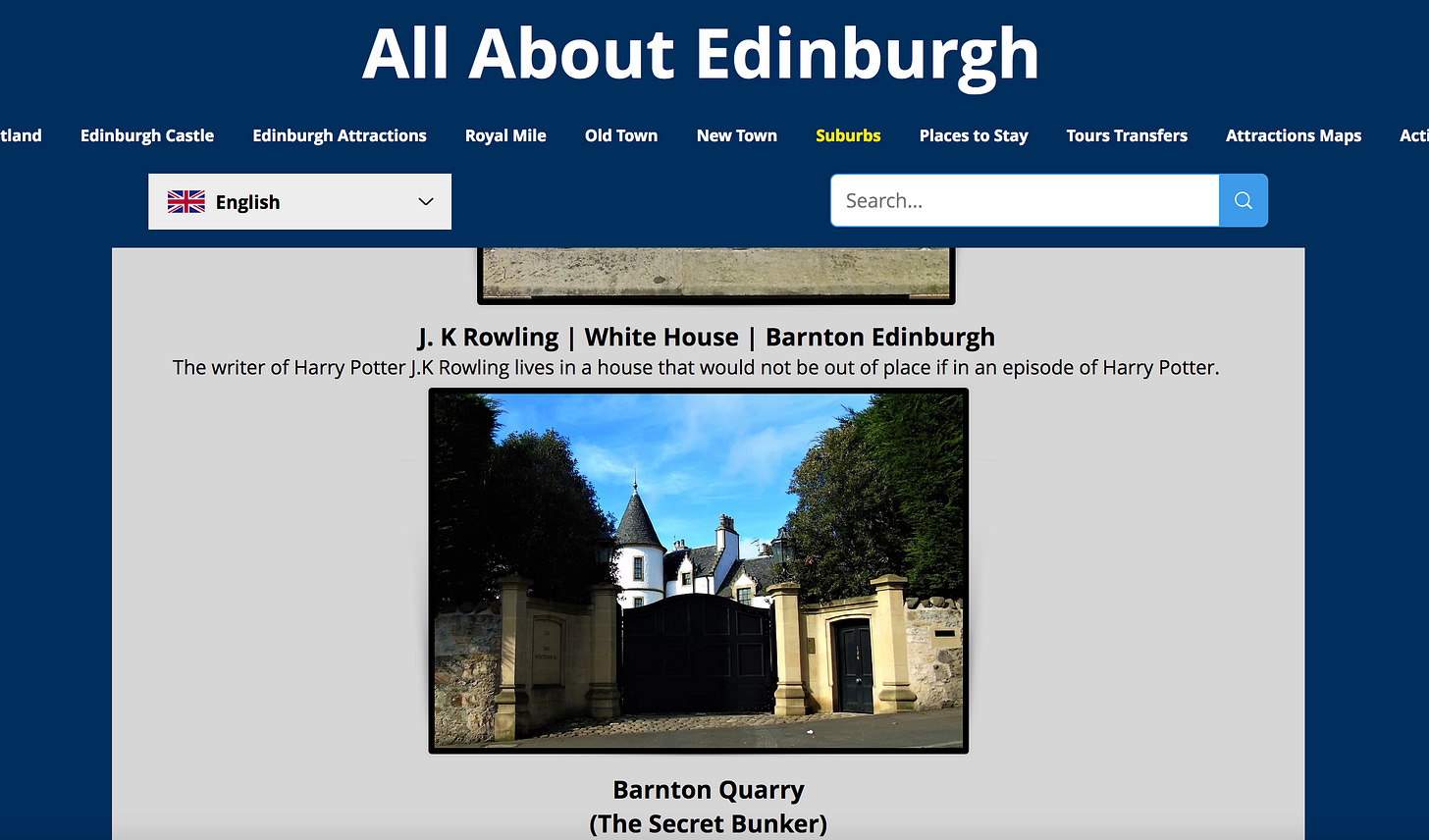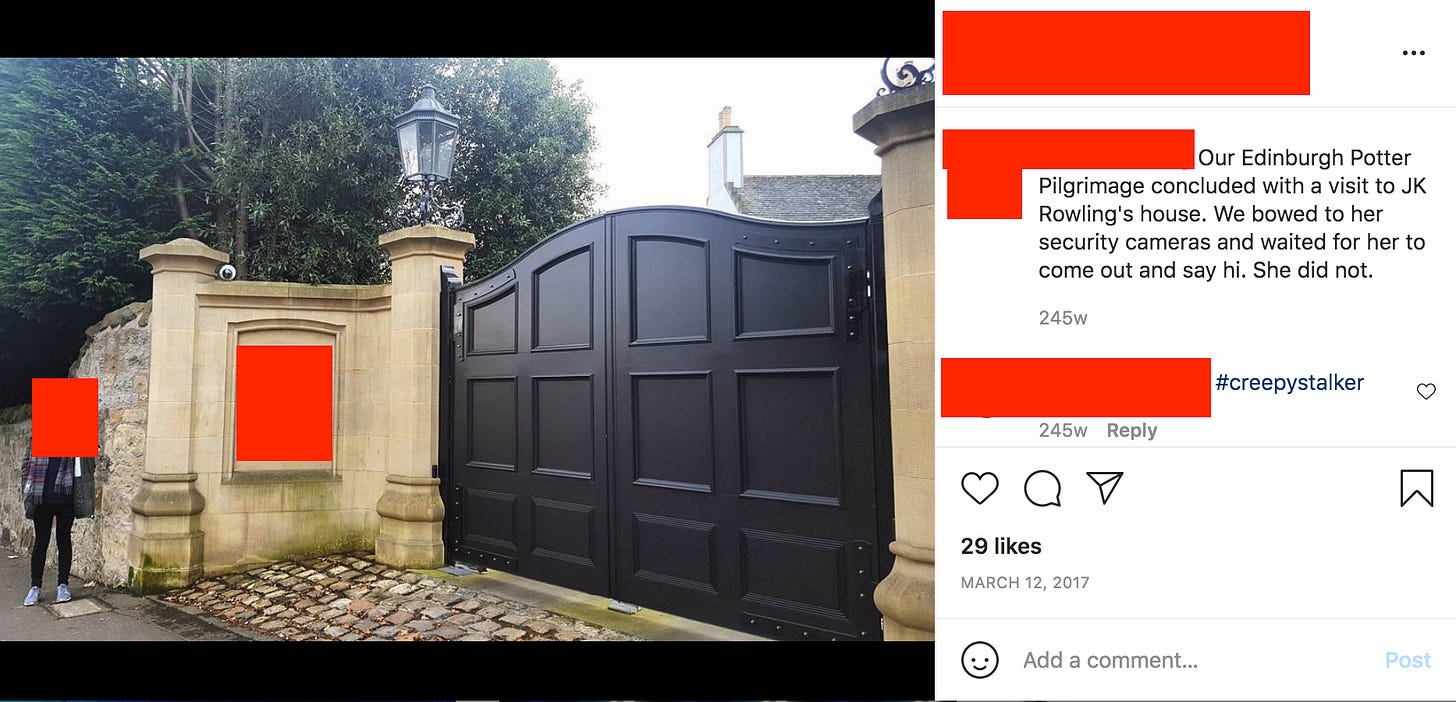Did Trans Activists Doxx J.K. Rowling?
Yes but also kind of no
On Friday, a Twitter user named Richard Energy posted a photo of themself and two friends holding protest signs outside the Edinburgh home of J.K. Rowling. The photo included her address.
On Monday, Rowling tweeted a thread in which she described the incident, identified all three people in the photo and said that she and other “gender critical” feminists have been subject to campaigns of harassment. She reiterated her commitment to speaking out about “women’s sex-based rights.”
On the face of it, this incident looks like the dictionary definition of “doxxing” — identifying or publishing private information about someone, especially as a form of punishment or revenge.
In Rowling’s case, however, it’s a bit more complicated.
Is It “Doxxing” If The Information Is Already Public?
Whether an act amounts to doxxing hinges in part on whether the information made public was private in the first place. It is not “doxxing” to reveal that Boris Johnson lives at 10 Downing Street or that Spike Lee can often be found at Knick’s games or that Ginuwine’s real name is Elgin Lumpkin. All of these things are common knowledge (well, one of them isn’t but should be) so shouting them from the rooftops, regardless of intent, doesn’t amount to an invasion of privacy.
Underneath these easy cases, however, is a surprisingly large grey area. A lot of information about you is technically public. If someone digs deep enough, they could probably unearth your address, phone number, former employers, your parents’ names, their addresses, and so on. Disseminating that information, even if it’s available on some dark corner of the internet, amounts to an immoral act because it makes it easier for large numbers of people to harass you without doing any work. That’s why doxxing is cruel: It facilitates abuse, even if the person who posted the information doesn’t engage in abuse themselves.
(There are obviously legal definitions at play here too but, as with the Bad Art Friend discourse, this case is primarily a debate over etiquette and morality, categories which sometimes overlap with the law and sometimes don’t.)
So, back to the case at hand, the question we need to answer isn’t just whether Rowling’s address was technically available, but whether it was easily available.
Immediately after she posted her thread, commenters claimed that Rowling’s address is so well known that it can be found in five seconds on google.
This, alas, is false. When we speak about the homes of British celebrities, we must be more specific than “the castle.” While it’s true that Rowling owns a rural residence with an easily googleable address and its own Wikipedia page, it bears no resemblance to the photo posted on Twitter. Here’s the front gate:
The activists posted the address of her other castle, a historic mansion in the outskirts of Edinburgh.
But here, too, we come up against the question of whether the information they posted was truly private. Rowling’s Edinburgh mansion is a well-known attraction that appears on local tourism websites:
And random photo galleries:
And videos by earnest little youtubers:
It is also, it seems, a bit of a fixture in local news. I found easily a half-dozen articles about an ongoing bustle in the neighborhood hedgerow:
So Rowling’s home isn’t exactly Superman’s Fortress of Solitude. It’s a well-known pilgrimage site and a feature of the local tourist scene.
However! All the news coverage I could find deliberately blurred out Rowling’s address. While photos of her home and the neighborhood she lives in are trivially easy to find, the specific address is not.
This makes sense to me: If some weirdo wanted to throw eggs at your house in the middle of the night, having a context-free photo wouldn’t be much help, even if they knew the general area. Your address would get them right to the front door. Anything that’s easier is going to happen more, and there’s no denying that a specific address makes finding someone easier.
This is why my own personal verdict is that the protestors should not have tweeted Rowling’s address. It seems like it’s quite easy to make your way to her house if you happen to be in Edinburgh, but that’s not the same as disseminating the street and number publicly. I disagree extremely strongly with Rowling’s views but I’m uncomfortable with something that comes this close to doxxing.
…
…
…
However!
There’s More to This Story
I loathe the way these dumb little internet controversies get taken out of context and boiled down to simplistic, binary questions. Did three random people ‘doxx’ JK Rowling? is not the only issue at play here and it’s crucially important to talk about this as as ongoing media event rather than an asinine argument about whether a specific tweet was bad.
The activists in question are hardly the first randos to post Rowling’s address on the internet. I’m blocking it out, obviously, but the address is clearly legible in all of these posts.
I’m not doing deep internet archaeology here. I put in an extremely obvious search term and had images featuring her address within seconds. It’s hard to believe Rowling when she says posting her address amounts to a violation of privacy and a threat to her safety when tourists have been posting it for years with no response.
And look, context matters. There’s a difference between clumsy tourists posting your address and political protesters posting your address and I can see why a public figure would object to one more strenuously than the other. Just because other people made the dumb decision to post a celebrity’s address doesn’t make Energy’s decision to do the same thing any better.
But let’s remember what we’re actually talking about here. At the time they posted Rowling’s address, Richard Energy had fewer than 1,000 Twitter followers. The post was only up for a few hours before they deleted it. Rowling’s home was already a site of pilgrimage for her fans and its address was readily available to anyone with access to Instagram.
Given all that, are we really supposed to believe it was appropriate for Rowling to respond by publicly announcing this entire episode to her 13.9 million followers and identify all three people in the photo?
I see no definition of doxxing that includes what Richard Energy did but does not include what J.K. Rowling did. Recall that the core immorality of doxxing is that it facilitates abuse. By including their names and twitter handles in her post, Rowling was ensuring that all three people in the photo would become nationwide objects of ridicule and experience a deluge of harassment.


And sure enough, that’s what is happening. All three Twitter accounts were gone within hours. Holly Stars, one of the people in the picture, said she’s experienced abuse on other platforms. I found Richard Energy’s youtube channel and their old videos are already getting swarmed with negative comments. This is how online harassment works: They chase you into every nook of the internet you’ve ever been on and try to humiliate you. I can only imagine what their e-mail inbox is like.
Every time this happens I feel like I’m losing my mind. Looking at this situation as a whole, am I really supposed to conclude that the random people who posted a dumb tweet are bigger villains than the world-famous, wildly powerful, mega-wealthy author who called them out by name?
No one remotely dedicated to the Spider-Man principle would say that Rowling behaved appropriately. She could have ignored the post. She could have tweeted about it without identifying the protesters. She could have reached out privately. The trans rights movement is constantly being lectured about the importance of civility and the strategic liability of “toxic activism.” I don’t see how the actions of three powerless people reflect on the trans rights movement but the actions of an influential public figure don’t reflect on the “gender critical” movement.
These controversies keep playing out the same way. Anti-trans campaigners seize on some “unreasonable” action (real or imagined) on the part of trans activists. Supporters of trans rights either denounce the action or refuse to, inviting another round of criticism. Either way, the vast majority of the population that doesn’t follow these issues closely gets the vague sense that Gee, trans people sure do a lot of things that need denouncing.
Meanwhile, campaigns of harassment against trans people — inevitably far larger than mobs of “trans activists” because there simply are not very many trans people in the population — are cast as justified retaliation. “Gender critical” campaigners are rarely called upon to denounce their own online mobs. People who point out the ugly behavior of transphobes online are cast as defending the original “unreasonable” act — So I guess you think it’s fine to doxx JK Rowling, huh?
It is frustrating to watch and tedious to participate in, a cycle that drives away mainstream journalists and alienates liberal readers. As I said in my Chappelle post, movements against social progress thrive on irrelevant distractions and minor controversies. If we are arguing about the murky ethics of a tweet, we are not arguing about the clear, unassailable case for trans rights.
Today, in other words, played out exactly as it was supposed to.




